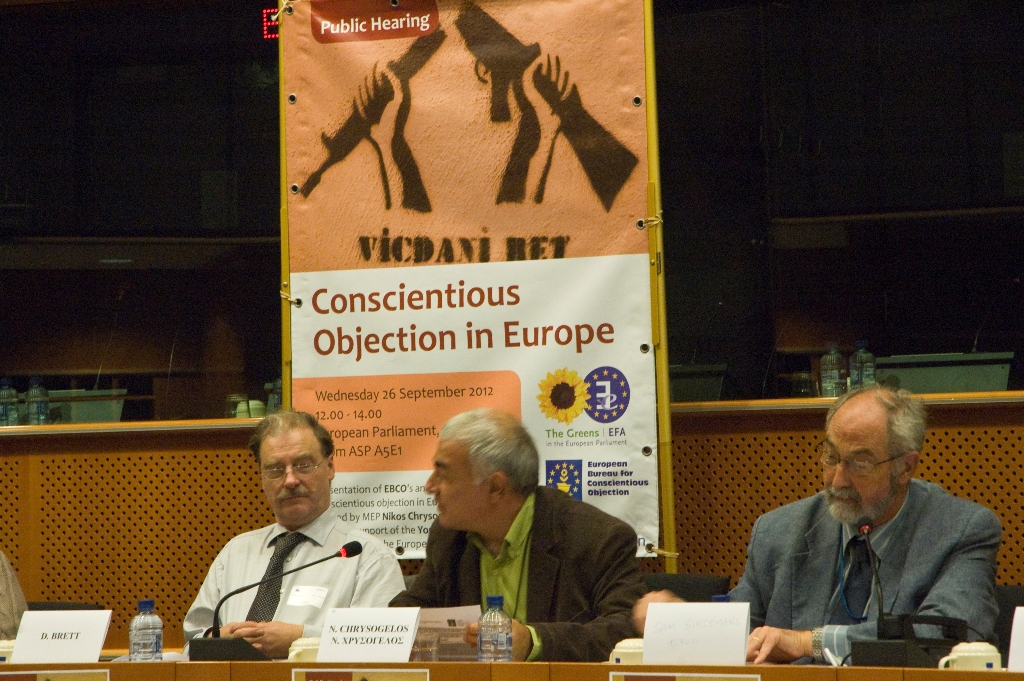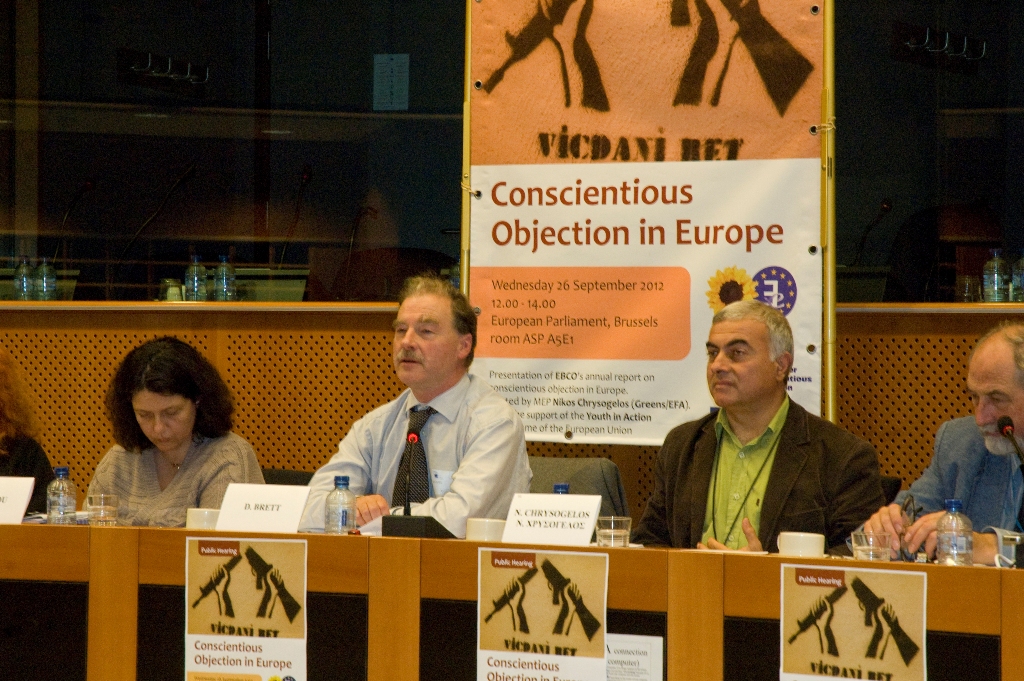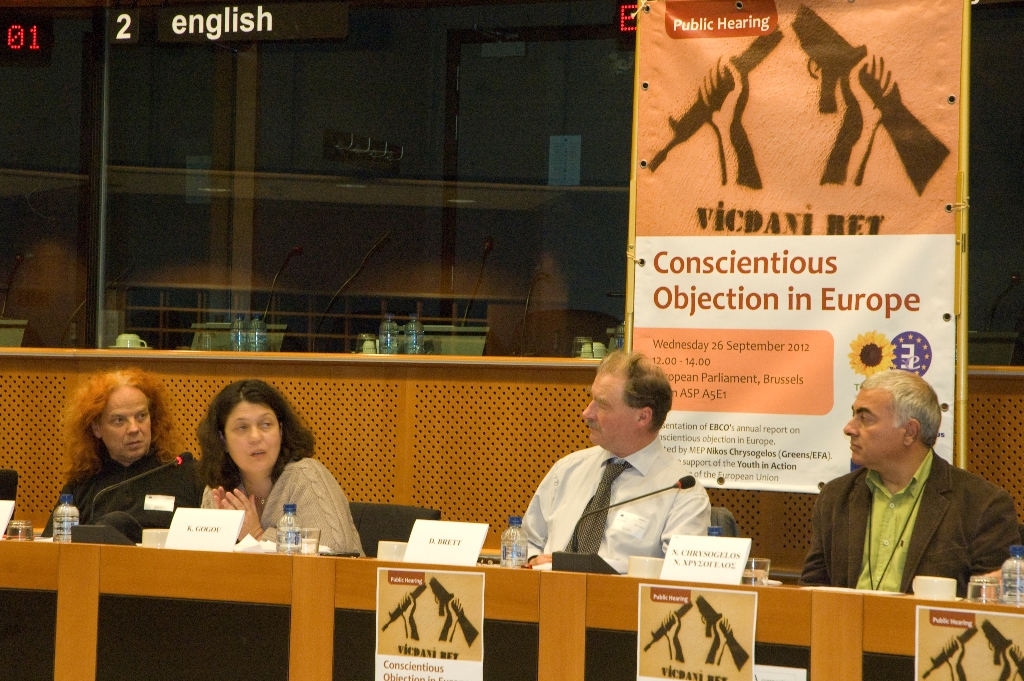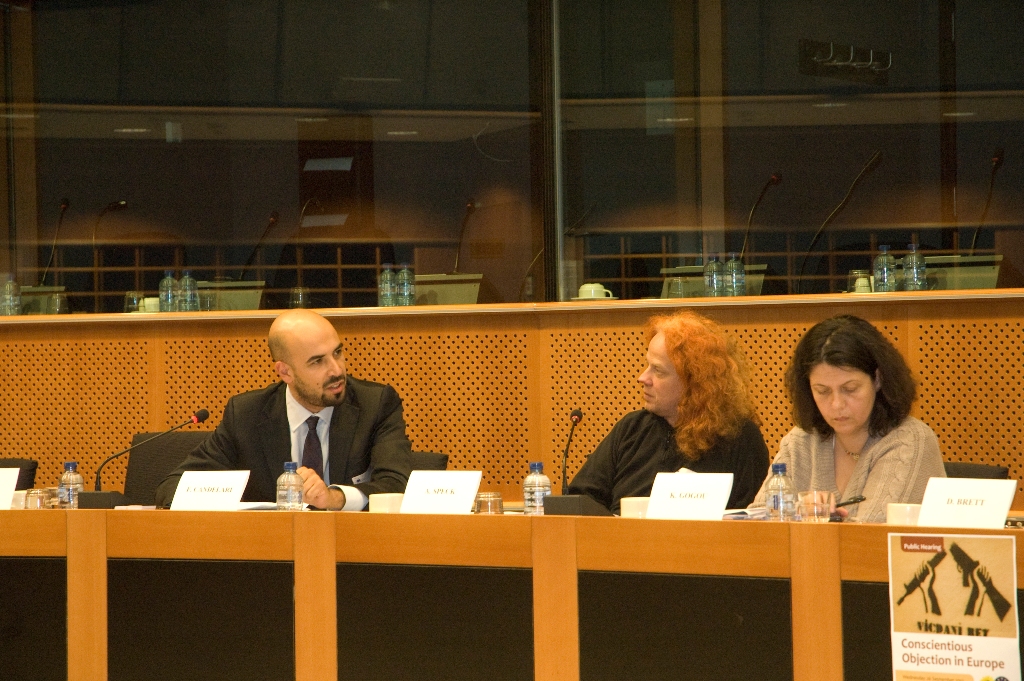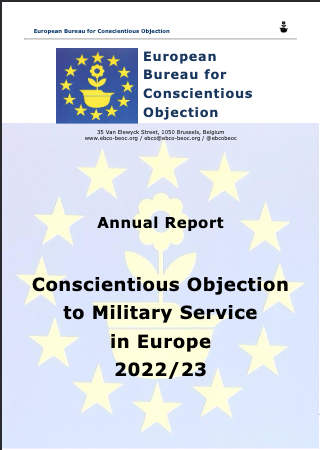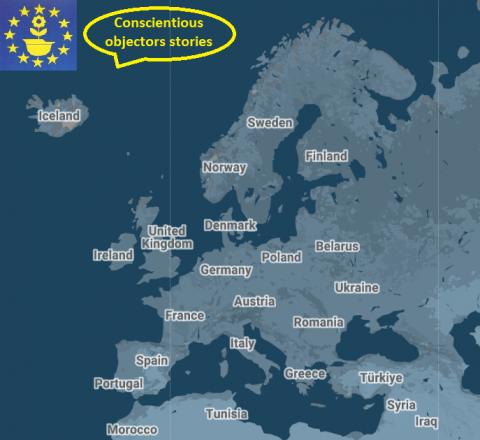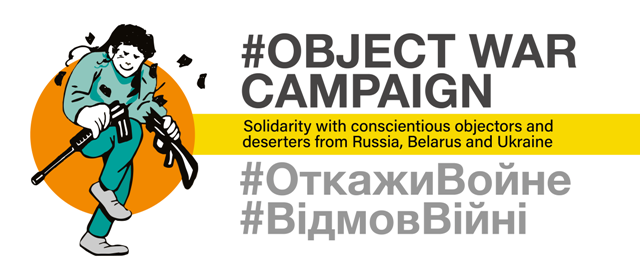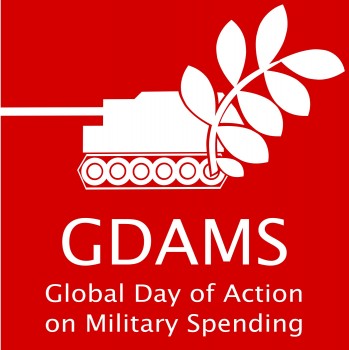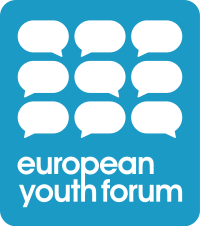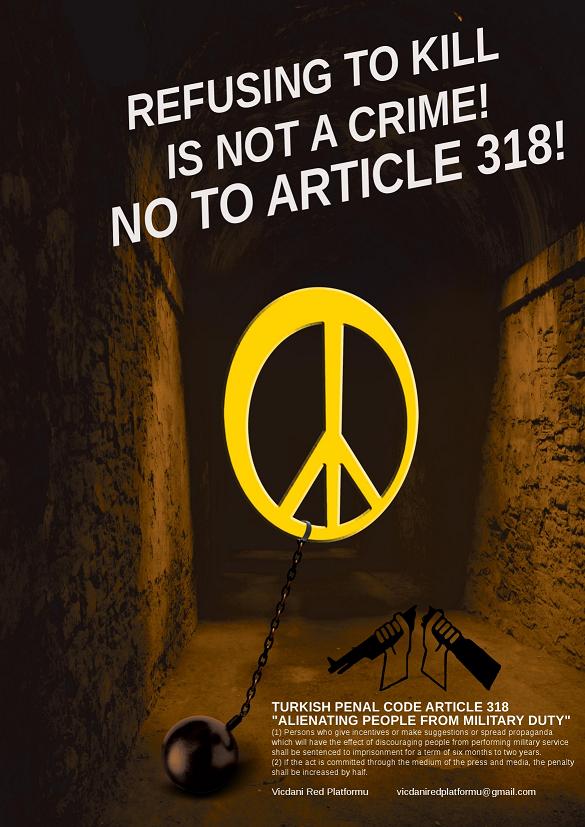Hearing in the European Parliament to present EBCO's annual report on the right to conscientious objection in the EU member states
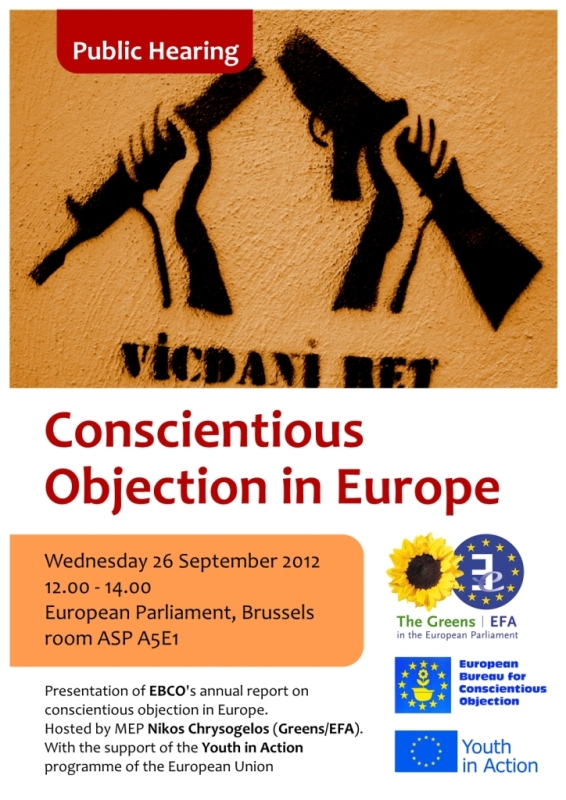
European Bureau for Conscientious Objection
PRESS RELEASE
EBCO’s report 2012 on conscientious objection to military service in Europe presented today in the European Parliament
Brussels, 26 September 2012
EBCO’s report 2012 on conscientious objection to military service in Europe was presented today by Derek BRETT (EBCO Researcher) in a publichearing hosted by MEP Nikos CHRYSOGELOS (Greens/EFA) in the European Parliament in Brussels. Sam BIESEMANS (EBCO Vice-President) introduced the report and referred to the steps so far, while Friedhelm SCHNEIDER (EBCO President) concluded and spoke about the next steps required now. EBCO’s report is submitted to the Committee on Civil Liberties, Justice and Home Affairs of the European Parliament (LIBE) in furtherance of Paragraph 16 of the Resolution on conscientious objection in the member states of the Community of 19 January 1994 (the Bandrés Molet and Bindi Resolution), under which the LIBE Committee was instructed "to draw up an annual report on the application by the Member States of its resolutions on conscientious objection and civilian service, and to involve the European Bureau for Conscientious Objection".
EBCO thanks MEP Nikos CHRYSOGELOS (Greens/EFA) for kindly hosting the public hearing, for supporting the right to conscientious objection, and for advocating for social cohesion and economic sustainability, instead of militarism and military spending. EBCO also thanks MEP Jo LEINEN (S&D) who accepted our invitation and reaffirmed his support for the right to conscientious objection, for which he had successfully advocated to be included in the Article 10 "Freedom of thought, conscience and religion" of the Charter of Fundamental Rights of the European Union: "The right to conscientiousobjection is recognised, in accordance with the national laws governing the exercise of this right". Last but not least, EBCO would like to thank all the representatives of the Non Governmental Organisations who honoured us with their participation and interesting contribution: Kondylia GOGOU (Amnesty International Researcher on Greece and Cyprus), Andreas SPECK (War Resisters’ International Right to Refuse to Kill Programme Worker), Francesco CANDELARI (International Fellowship Of Reconciliation International Coordinator), and Luis Alvarado MARTINEZ (AEGEE-Europe / European Students' Forum President).
You can read EBCO’s report 2012 here: (english)
You can watch the video of the public hearing (english) and read the press release of the office of MEP Nikos Chrysogelos (greek) here:
 With the support of the Youth in Action programme of the European Union
With the support of the Youth in Action programme of the European Union
This project has been funded with support from the European Commission. This publication reflects the views only of the author, and the Commission cannot be held responsible for any use which may be made of the information contained therein.
EBCO press contacts:
Derek Brett, EBCO Researcher, +41 77 462 9825, derekubrett@gmail.com
Friedhelm Schneider, EBCO President, +49 152 044 776 75, friedhelm.schneider@gmx.de
Sam Biesemans, EBCO Vice-President, +32 477 268 893, sambiesemans@skynet.be
FOREWORD by Friedhelm Schneider, EBCO President
When EBCO submitted its last annual report to the European Parliament, in May 2011, we were still hampered by the jurisprudence of the European Court of Human Rights, which had not explicitly recognised the right of conscientious objection to military service.
7th July 2011 is a date which will forever be remembered by conscientious objectors. For that was when, in the case of Bayatyan v Armenia, the Grand Chamber of the European Court of Human Rights decided, with only the Armenian judge dissenting, that conscientious objection to military service, as a manifestation of deeply held religious or other beliefs, is protected under the European Convention on Human Rights, whether or not there are appropriate provisions in national law.
As the present report shows, the European Court of Human Rights has not been slow to follow the Bayatyan precedent in a number of further cases from Turkey and Armenia itself. In the process, it has also underlined that the repeated prosecution of, and systematic deprivation of civil rights from, those who have not performed military service constitutes inhuman and degrading treatment, and that persons who do not agree to be recruited should continue to be treated as civilians and should not be put before military courts on military disciplinary charges. Nevertheless, conscientious objectors in Greece continue to appear before military courts. Meanwhile, in the UK, the case of former Leading Medical Assistant Michael Lyons displays the limitations of procedures to consider applications for release by serving members of the military who have developed conscientious objections if these procedures are not sufficiently independent of the military chain of command.
In most of the European Union and candidate and potential candidate countries the problematic and anachronistic practice of conscription into obligatory military service is no longer taking place. In most cases, however, it has formally been suspended rather than abolished. In some Member States registration for military service continues. And there has been no progress on related issues of grave concern to EBCO. Several Member States have not yet raised their minimum recruitment age to 18, and continue to give the military privileged access to schools for recruitment purposes; the end of conscription in Germany has seen an increased level of military presence in schools. The situation of serving members of the armed forces has already been mentioned. And military expenditure continues to be largely shielded from the effects of the economic crisis, which consequently fall even more heavily on social welfare programmes.
The right of conscientious objection to military service is explicitly mentioned in Article 10.2 of the Fundamental Rights Charter of the EU (which came into force with the adoption of the Lisbon treaty). It however receives surprisingly little attention from the European Parliament. The issue is no longer mentioned neither in the Parliament's annual report on human rights in the world. Nor does it feature in the annual reports of the European Agency for Fundamental Rights. It is high time that violations of the human right of conscientious objection to military service were highlighted in the human rights framework of the EU.
In July this year, the Human Rights Council of the United Nations adopted the first resolution on conscientious objection to military service since it replaced the Commission on Human Rights in 2006. The resolution mandated a report on recent developments, which should lead to a substantive resolution in 2013. The new jurisprudence from the European Court of Human Rights, and other normative developments at the international level covered in this report make it more urgent than ever that the European Parliament too should turn its attention to a new resolution embodying the advances in thinking since the Bandres Molet and Bindi Resolution of 1994. In the coming months EBCO will be engaging with members of your Committee in an attempt to find sponsors for a new resolution.
Finally, I cannot end this introduction without paying tribute to my predecessor as President of EBCO, Gerd Greune, whose sudden death on 24h August at the age of 63 shocked us all. Gerd was one of the founders of EBCO, and also a former Secretary-General of the International Peace Bureau. Up to his death he was actively involved in many countries in his roles as President and Secretary-General of the Institute For International Assistance and Solidarity, and Development Director of the Arab Media Internet Network. His loss is a great blow to the entire European peace movement.
Sam Biesemans (EBCO Vice-President) said that Gerd Greune was a big reference for us; a personality involved so many years in the peace and conscientious objection movement. So it’s now a role for us to take over his task and his commitment to continue his work. Sam Biesemans then said that the Council of Europe was the first institution which worked on the right to conscientious objection to military service in Europe. The first resolutions were adopted by the Parliamentary Assembly of the Council of Europe. Much later on the Committee of Ministers followed this, but it took a lot of time. This shows the importance of parliaments because the members of parliaments can be innovative; especially in the field of human rights related to defence. The European Court of Human Rights is also important and plays a crucial role in the implementation of the human rights of conscientious objectors in the Council of Europe member states. The first resolution on conscientious objection in the European Union was the Macciocchi Resolution in 1983. The treaty of Lisbon explicitly includes the right to conscientious objection to military service; so all the member states should recognise it. And it’s a duty of the European Commission to check in each enlargement that the candidate member states integrate this right in their national legislation. Finally, a big unsolved problem is the right to asylum for conscientious objectors who refuse to take part in the military or war situations like in Iraq and Afghanistan, and seek asylum in EU counties.
Derek BRETT (EBCO Researcher) presented the findings of the report, referring first to the developments in the international standards and jurisprudence (European Court of Human Rights, Council of Europe Commissioner for Human Rights, Parliamentary Assembly of the Council of Europe, UN Human Rights Committee and UN Human Rights Council) and then to the developments within member states and candidate countries (Germany, Finland, Turkey, Cyprus, Greece). He gave an overview of the current position regarding obligatory military service in EU member states, candidate countries and potential candidate countries, and expressed EBCO’s ongoing concerns about the provision for serving members of the military who develop conscientious objections, and about juvenile recruitment, conscientious objectors as refugees and military expenditure.
Finally Derek Brett highlighted EBCO’s recommendations:
· to the European Parliament:
- that it prepare a new resolution on conscientious objection to military service to incorporate the advances which have been made in the recognition of this right since the Bandres Molet & Bindi resolution of 1994.
- that (given that the right of conscientious objection to military service is explicitly mentioned in the EU's Charter of Fundamental Rights, which came into force with the adoption of the Lisbon Treaty) this issue be included in the Parliament's annual report on human rights in the world.
- that the Parliament also encourage the European Agency for Fundamental Rights to include this issue in its annual reports.
· to all EU Member States, Candidate Countries and Potential Candidate Countries:
- that if they have not already done so they suspend (or preferably abolish) all obligatory military service.
- that (in accordance with Recommendation CM/Rec(2010)4 of the Committee of Ministers of the Council of Europe) they make it possible for all serving members of the armed forces to obtain release on the basis of conscientious objection.
- that they cease enlistment into the armed forces on any basis of persons aged under 18.
- that they give sympathetic consideration to applications for asylum from all persons seeking to escape military service in any country where there is no adequate provision for conscientious objectors.
- that they reconsider the necessity for the current levels of military expenditure with particular reference to the current economic situation.

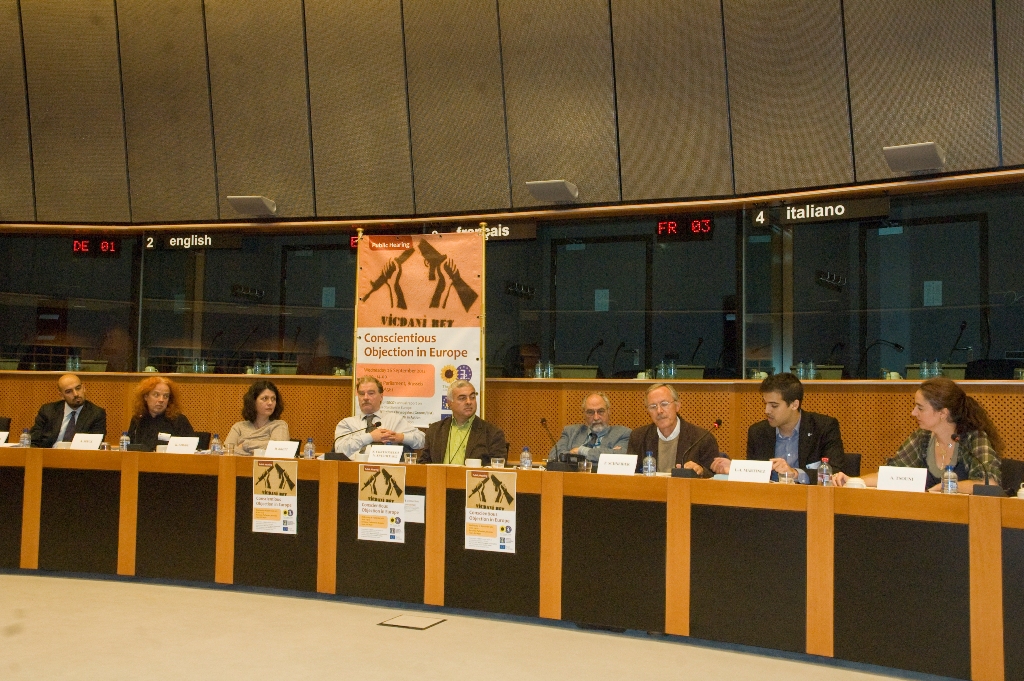
From left to right: Francesco CANDELARI, Andreas SPECK, Kondylia GOGOU, Derek BRETT, Nikos CHRYSOGELOS, Sam BIESEMANS, Friedhelm SCHNEIDER, Luis Alvarado MARTINEZ, Alexia TSOUNI
MEP Nikos CHRYSOGELOS (Greens/EFA)expressed his full support for the right to conscientious objection and his solidarity with the conscientious objectors in Greece and other countries. He underlined that Greece, amidst financial crisis and harsh austerity measures, spent 5.85 billion Euros for military purposes in 2011, 4.7% more than in 2010, which represent 2,6% of the greek GDP (2nd higher in Europe) and 544 euros per Greek citizen (3rd higher in Europe). The relation of the accumulated military spending with the greek public debt has been thoroughly researched by the group of MEP Nikos Chrysogelos. Nikos Chrysogelos said that the crisis we are experiencing today should make us realise that the adherence in outdated perceptions that the security and the protection of the society is ensured mainly by increasing military spending and militarisation, not only has proven disastrous for the economy and the society, but also has revealed a strong nexus of corrupted political actors in the administration and military industry. This issue remained taboo in Greece and other countries. It should no longer remain on the margin of the political debate. On the occasion of ensuring the internationally guaranteed rights of conscientious objectors, we should look for alternative ways to ensure that the social welfare and the security of the countries and their citizens will be based mainly on social cohesion and sustainable economy.
MEP Jo LEINEN (S&D) said that it should be common sense that the right to conscientious objection to military service is a fundamental right of everybody. We should put more pressure on the member states that still not fulfil this obligation. Conscientious objection goes along with the overall idea of demilitarising our societies. We have military thinking, military spending, military behaviours in many parts of the society. After the cold war there was the hope that the military budgets go down, military thinking is replaced by civilian projects like health, education, innovation research. But the military industrial complex, the lobbyists who earn their profits with military thinking are powerful and survive. The projects go more and more costly, eating up public money that we urgently need for other purposes. We have to take care together that Europe expresses itself as a soft power with many values and many capacities that are not military, and not turning into a military power and then having this arms race like the USA, China, Russia etc. Conscientious objection is a universal issue, not only related to the European Union. We should do our best to help those courageous people in other countries.
Kondylia GOGOU (Amnesty International Researcher on Greece and Cyprus) presented the continuing concerns of Amnesty International on the way conscientious objectors are treated in Greece. In Greece there are repeated prosecutions of conscientious objectors. Recent cases include professional soldier Nikolaos Ksiarhos, 45-year-old Avraam Pouliasis, and total objector Gerasimos Koronaios. The length of alternative service remains punitive for the vast majority of the conscripts, being 15 months versus 9 months of military service, which is definitely not proportional. Another problem is that the Ministry of Defence determines the status of conscientious objectors. There are also concerns on the quality of the decisions for various reasons. Moreover, conscientious objectors are tried by military courts; which is contrary to the European Convention of Human Rights, as ruled in recent judgements. Kondylia Gogou also passed some comments from her colleagues on Turkey. Fist of all Amnesty International is concerned that in Turkey the right to conscientious objection is still not adopted in the legislation. In addition to that, the law criminalises the right to speak against conscription, and people are prosecuted for that. Furthermore, Turkey fails to execute the judgments of the European Court of Human Rights.
Andreas SPECK (War Resisters’ International Right to Refuse to Kill Programme Worker)underlined first of all that conscientious objection has a perspective of demilitarising our societies. He noted that although conscription has ended in most of the EU member states, most of them still don’t recognise the right to conscientious objection for the professional soldiers (only Germany, the Netherlands and the United Kingdom do). Another concern is the status of conscientious objection in the countries which have suspended or abolished conscription. Research is needed on this issue to look into what would be the status of conscientious objection if conscription was enforced again. In addition, more research and campaigning are needed about the right to conscientious objection of the professional soldiers. In Germany six professional soldiers applied and were recognised as conscientious objectors; there may be thousands in EU but we don’t know it. Andreas Speck also stressed that the end of conscription doesn’t mean the end of militarisation and militarism.
Francesco CANDELARI (International Fellowship Of Reconciliation International Coordinator)remembered the young people who stood up against war and militarism during the first and second world war and faced death penalty. He stated that we are still facing many challenges, but there have also been many achievements, and we need to acknowledge this. Francesco Candelari stressed that young people need to breach the frontier of militarism and enter the forefront as pioneers of reconciliation and peace, highlighting the issue of conscientious objection to military service as a new paradigm and a new frontier for the demilitarization of modern societies. In a broader context, Francesco Candelari pointed out the need for young people to be pioneers of new achievements and to set new frontiers to advance human rights and democracy and defend social rights together with civil rights.
Luis Alvarado MARTINEZ (AEGEE-Europe / European Students' Forum President)stressed the fact that the conscription arrives at a crucial moment of students’ life, breaking up the storyline of their life. It has been noted with concern that AEGEE members, after years of working actively in AEGEE for values like democracy, peace and stability, and tolerance, got severely stressed when facing the moment of conscription. Luis Alvarado Martinez stated that AEGEE considers that there are different and better ways to contribute to society than joining the military, and volunteering is on of them. He underlined that the right to conscientious objection exists on paper, so now AEGEE just needs to make European youth aware of it, and stay alert to make sure that it is respected by their countries. This is the main aim of EBCO, and AEGEE will help them.
